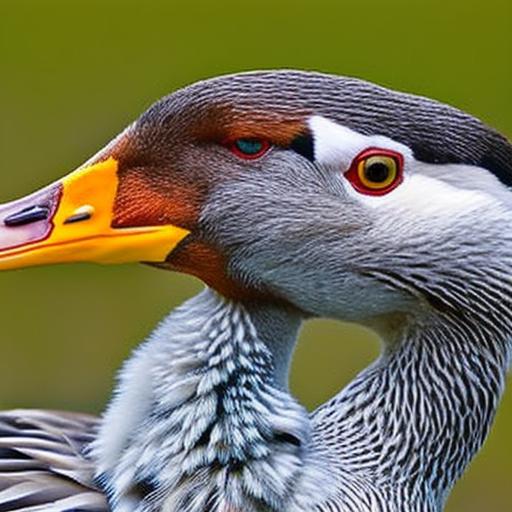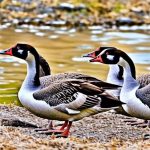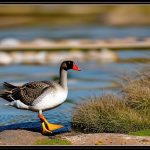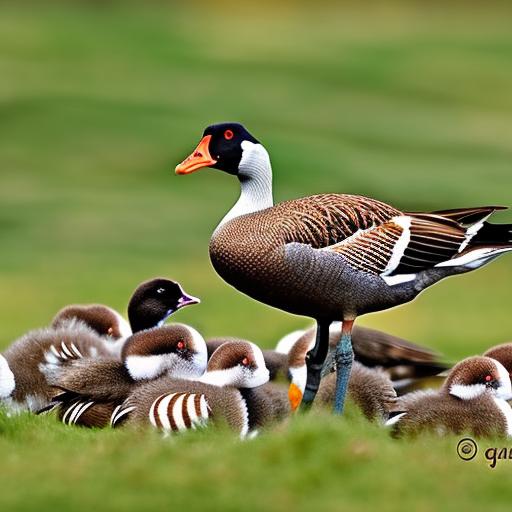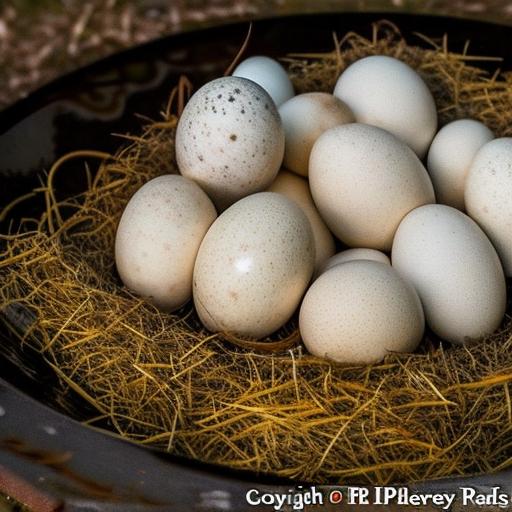Domestic geese breeding has been a popular practice for centuries, with these birds being valued for their meat, eggs, and feathers. Geese are known for their hardy nature and adaptability, making them an ideal choice for small-scale farmers and homesteaders. Breeding domestic geese can be a rewarding experience, but it requires careful planning and management to ensure success. In this article, we will explore the various aspects of domestic geese breeding, including the reproductive cycle, mating behavior, nesting and egg-laying behavior, incubation and hatching, as well as the care and management of breeding geese. We will also discuss the factors that can affect the breeding period of domestic geese, as well as the challenges and solutions that breeders may encounter.
Understanding the Reproductive Cycle of Domestic Geese
The reproductive cycle of domestic geese is influenced by various factors, including the breed of the geese, their age, and environmental conditions. Geese typically reach sexual maturity at around 9 to 10 months of age, although this can vary depending on the breed. The reproductive cycle of geese is also influenced by the length of daylight, with longer days triggering the onset of breeding behavior. In general, geese are seasonal breeders, with the breeding season typically occurring in the spring and early summer. During this time, geese will exhibit mating behavior, build nests, and lay eggs. It is important for breeders to understand the reproductive cycle of geese in order to effectively manage their breeding program and maximize the chances of successful reproduction.
Factors Affecting the Breeding Period of Domestic Geese
Several factors can affect the breeding period of domestic geese, including nutrition, housing, and environmental conditions. Geese require a balanced diet that is rich in protein, vitamins, and minerals in order to support their reproductive health. Inadequate nutrition can lead to poor egg production and fertility issues. Additionally, geese require access to clean water and a suitable nesting area in order to successfully breed. Housing conditions can also impact the breeding period, with overcrowding and poor ventilation leading to stress and reduced reproductive performance. Environmental conditions, such as temperature and humidity, can also influence the breeding period of geese. Extreme heat or cold can disrupt the breeding cycle and lead to decreased egg production and hatchability. It is important for breeders to provide geese with optimal conditions in order to support their reproductive health and maximize breeding success.
Signs of Mating Behavior in Domestic Geese
Mating behavior in domestic geese is characterized by several distinct signs, including vocalizations, posturing, and physical interactions. During the breeding season, male geese, known as ganders, will often engage in vocal displays to attract females. They may also engage in physical displays, such as flapping their wings and raising their heads, to impress potential mates. Female geese, known as geese, will also exhibit signs of receptivity, such as crouching and vocalizing in response to the advances of the ganders. Once a pair has formed, they will engage in courtship behavior, which may include preening each other and engaging in mutual vocalizations. It is important for breeders to be able to recognize the signs of mating behavior in geese in order to determine the success of their breeding program and identify any potential issues that may arise.
Nesting and Egg-Laying Behavior in Domestic Geese
Nesting and egg-laying behavior in domestic geese is an important aspect of the breeding process. Geese will typically seek out a suitable nesting site, such as a secluded area with access to water, in order to build their nest. They will use a combination of feathers, grass, and other materials to construct a shallow depression in which to lay their eggs. Geese are known for their strong maternal instincts and will fiercely defend their nests and eggs from potential threats. Once a nest has been established, geese will begin laying eggs, with the average clutch size ranging from 5 to 12 eggs. Geese are known for their high level of egg production, with some breeds capable of laying up to 60 eggs per year. It is important for breeders to provide geese with a suitable nesting area and to monitor their egg-laying behavior in order to ensure the health and well-being of the breeding flock.
Incubation Period and Hatching of Goslings
After the eggs have been laid, geese will begin the incubation process, which typically lasts for around 28 to 30 days. During this time, the female goose will diligently sit on the eggs to keep them warm and protect them from predators. Geese are known for their strong maternal instincts and will rarely leave the nest during the incubation period. Once the eggs have hatched, the goslings will emerge and begin to explore their surroundings under the watchful eye of their mother. Goslings are precocial, meaning that they are born with their eyes open and are capable of walking and feeding themselves shortly after hatching. It is important for breeders to provide geese with a suitable nesting area and to monitor their egg-laying behavior in order to ensure the health and well-being of the breeding flock.
Care and Management of Breeding Geese
The care and management of breeding geese is essential for ensuring the health and well-being of the breeding flock. Geese require access to clean water, a balanced diet, and suitable housing in order to support their reproductive health. It is important for breeders to provide geese with a diet that is rich in protein, vitamins, and minerals in order to support their reproductive health. Additionally, geese require access to clean water and a suitable nesting area in order to successfully breed. Housing conditions can also impact the breeding period, with overcrowding and poor ventilation leading to stress and reduced reproductive performance. It is important for breeders to provide geese with optimal conditions in order to support their reproductive health and maximize breeding success.
Breeding Season and Its Impact on Geese Behavior
The breeding season can have a significant impact on the behavior of geese. During this time, geese will exhibit mating behavior, build nests, and lay eggs. Geese are known for their strong maternal instincts and will fiercely defend their nests and eggs from potential threats. Once a nest has been established, geese will begin laying eggs, with the average clutch size ranging from 5 to 12 eggs. Geese are known for their high level of egg production, with some breeds capable of laying up to 60 eggs per year. It is important for breeders to provide geese with a suitable nesting area and to monitor their egg-laying behavior in order to ensure the health and well-being of the breeding flock.
Breeding Challenges and Solutions for Domestic Geese
Breeding domestic geese can present a number of challenges, including fertility issues, poor egg production, and hatchability problems. These challenges can be caused by a variety of factors, including inadequate nutrition, housing conditions, and environmental stress. In order to address these challenges, breeders should ensure that their geese are provided with a balanced diet that is rich in protein, vitamins, and minerals. Additionally, geese require access to clean water and a suitable nesting area in order to successfully breed. Housing conditions can also impact the breeding period, with overcrowding and poor ventilation leading to stress and reduced reproductive performance. It is important for breeders to provide geese with optimal conditions in order to support their reproductive health and maximize breeding success.
Conclusion and Recommendations for Successful Breeding of Domestic Geese
In conclusion, breeding domestic geese can be a rewarding experience, but it requires careful planning and management to ensure success. By understanding the reproductive cycle of geese, recognizing the signs of mating behavior, and providing optimal care and management, breeders can maximize the chances of successful reproduction. It is important for breeders to provide geese with a balanced diet, access to clean water, and suitable housing in order to support their reproductive health. Additionally, breeders should monitor the behavior of their geese and address any challenges that may arise in order to ensure the health and well-being of the breeding flock. With proper care and management, breeders can enjoy the benefits of breeding domestic geese and contribute to the preservation of these valuable birds.
Meet Walter, the feathered-friend fanatic of Florida! Nestled in the sunshine state, Walter struts through life with his feathered companions, clucking his way to happiness. With a coop that’s fancier than a five-star hotel, he’s the Don Juan of the chicken world. When he’s not teaching his hens to do the cha-cha, you’ll find him in a heated debate with his prized rooster, Sir Clucks-a-Lot. Walter’s poultry passion is no yolk; he’s the sunny-side-up guy you never knew you needed in your flock of friends!

